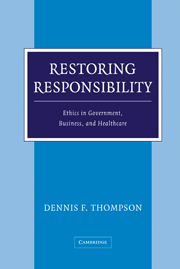Book contents
- Frontmatter
- Contents
- Acknowledgments
- Restoring Responsibility
- Introduction: The Need for Institutional Responsibility
- PART I DEMANDS OF INSTITUTIONAL POLITICS
- 1 The Problem of Many Hands
- 2 The Responsibility of Advisers
- 3 Bureaucracy and Democracy
- 4 Judicial Responsibility
- 5 Representatives in the Welfare State
- PART II VARIETIES OF INSTITUTIONAL FAILURE
- Part III EXTENSIONS OF INSTITUTIONAL RESPONSIBILITY
- Credits
- Index
1 - The Problem of Many Hands
Published online by Cambridge University Press: 29 January 2010
- Frontmatter
- Contents
- Acknowledgments
- Restoring Responsibility
- Introduction: The Need for Institutional Responsibility
- PART I DEMANDS OF INSTITUTIONAL POLITICS
- 1 The Problem of Many Hands
- 2 The Responsibility of Advisers
- 3 Bureaucracy and Democracy
- 4 Judicial Responsibility
- 5 Representatives in the Welfare State
- PART II VARIETIES OF INSTITUTIONAL FAILURE
- Part III EXTENSIONS OF INSTITUTIONAL RESPONSIBILITY
- Credits
- Index
Summary
Philosophers and political scientists in recent years have begun to apply moral principles to public policy and to public officials. None of these scholars supposes that moral principles can, without modification, be directly deployed in politics. Indeed, one of their preoccupations is the possibility that public life may require officials to act in ways that would be wrong in private life, raising the classic problem of “dirty hands” (Walzer 1973). But in a significant respect, their analyses are often apolitical: the official they portray agonizing over a moral dilemma seems a solitary figure, single-handedly gathering information and implementing decisions. This paradigm of the lonely leader obscures a pervasive feature of modern government – a feature that stands in the way of applying moral principles, whatever their content, to individual officials. Because many different officials contribute in many ways to decisions and policies of government, it is difficult even in principle to identify who is morally responsible for political outcomes. This is what I call the problem of many hands.
The two most common ways of ascribing responsibility to officials – the hierarchical and the collective models – do not adequately respond to this problem; and personal responsibility, suitably interpreted, can be imputed to officials more often than these models suggest. The criteria for personal responsibility I adopt are common to a wide range of moral theories; they hold us responsible for outcomes insofar as we cause them and do not act in ignorance or under compulsion. On the se criteria we can say that one official is more or less responsible than another official without implying, as in the law, that degrees of fault correspond to proportionate shares of compensation
Information
- Type
- Chapter
- Information
- Restoring ResponsibilityEthics in Government, Business, and Healthcare, pp. 11 - 32Publisher: Cambridge University PressPrint publication year: 2004
Accessibility standard: Unknown
Why this information is here
This section outlines the accessibility features of this content - including support for screen readers, full keyboard navigation and high-contrast display options. This may not be relevant for you.Accessibility Information
- 2
- Cited by
